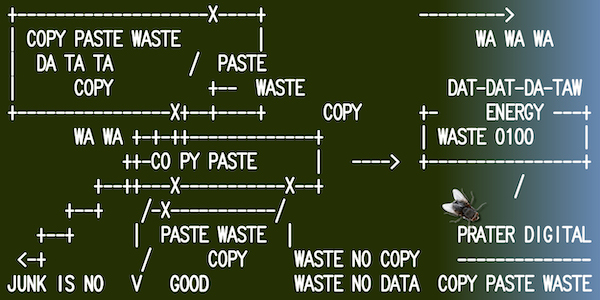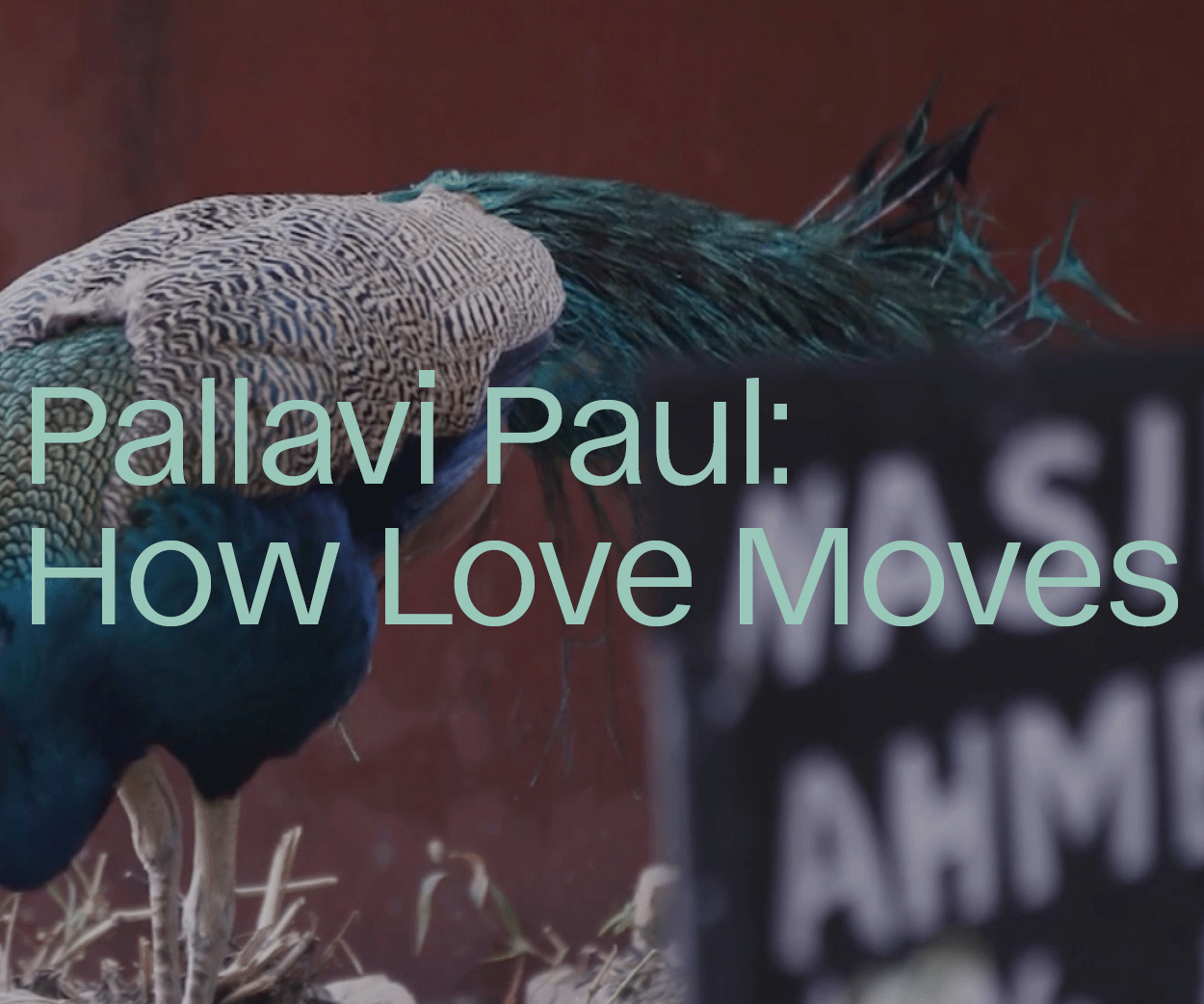by Annalisa Giacinti // Feb. 27, 2024
This article is part of our feature topic Utopia.
Though she trained as a journalist and admits being naturally more proficient in writing books than putting together exhibitions, Laia Abril loves the randomness of the art world. She is intrigued by its large reach and potential; titillated by the thought of her photographs landing before an assorted crowd of interested (or not) visitors. The transition from journalism to art-making happened organically, she told us during the tour of her current exhibition at C/O Berlin, as all her works grapple with reality and news stories she chances upon.
‘On Rape – And Institutional Failure’ is the second chapter of a long-term research project called ‘A History of Misogyny,’ started by Abril in 2014 to rigorously investigate the modus operandi of systemic gender-based violence and bring visibility to its victims. In so doing, she invests her political drive in fashioning a utopia in which institutions finally reckon with their violent history and make it their responsibility to ensure safety and equality.
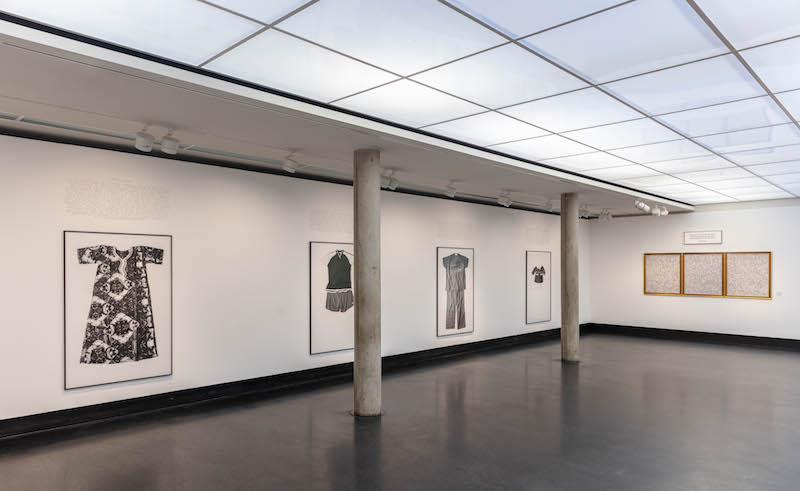
Laia Abril: ‘On Rape – And Institutional Failure,’ 2024, installation view at C/O Berlin // © C/O Berlin Foundation, photo by David von Becker
Chapter one, ‘On Abortion’ (2016), documented the risks and repercussions of the lack of legal, safe and free access to abortion through the demystification of stigmas that continue to erode women’s reproductive rights. Chapter two developed following a case of rape that took place in Spain in 2018. After five Spanish men, self-named La Manada (The Wolf Pack) gang-raped an 18-year-old woman, they were released on bail and later charged merely for sexual harassment on the grounds that the video they filmed–showing the victim, Daniela, frozen and with her eyes shut–was proof of consent.
Triggered by the episode, and against the backdrop of the #MeToo movement and the sprawl of stories of assaults that surfaced, ‘On Rape’ is an obvious continuation of her painstaking project. It examines why such institutional failures occur; the pitfalls of a flawed justice system upheld by unequal power dynamics and deep-rooted patriarchal precepts.
Visual, audio and textual evidence are all part of the artist’s repertoire, yet hardly any people or faces are displayed in the exhibition. At the height of the movement and the uproar it generated, victims’ faces appeared everywhere: on magazine covers, on the news, they were being shared over and over on social media. Abril found it all a bit morbid and frustrating–let’s give these women a break, she thought. Having observed the complex relationship between experience, image and language, as well as the limits of depicting trauma, Abril shifted the attention from the individual to the collective, focusing on political and social responsibility, and using visual metaphors as her main medium: black and white photographs of artefacts that connect ambivalently to the accompanying text. As a result, her portrayal of trauma is perceptive yet no less poignant, persuasive but not exploitative. She doesn’t partake in journalistic sensationalism or the sickly pornography of pain.
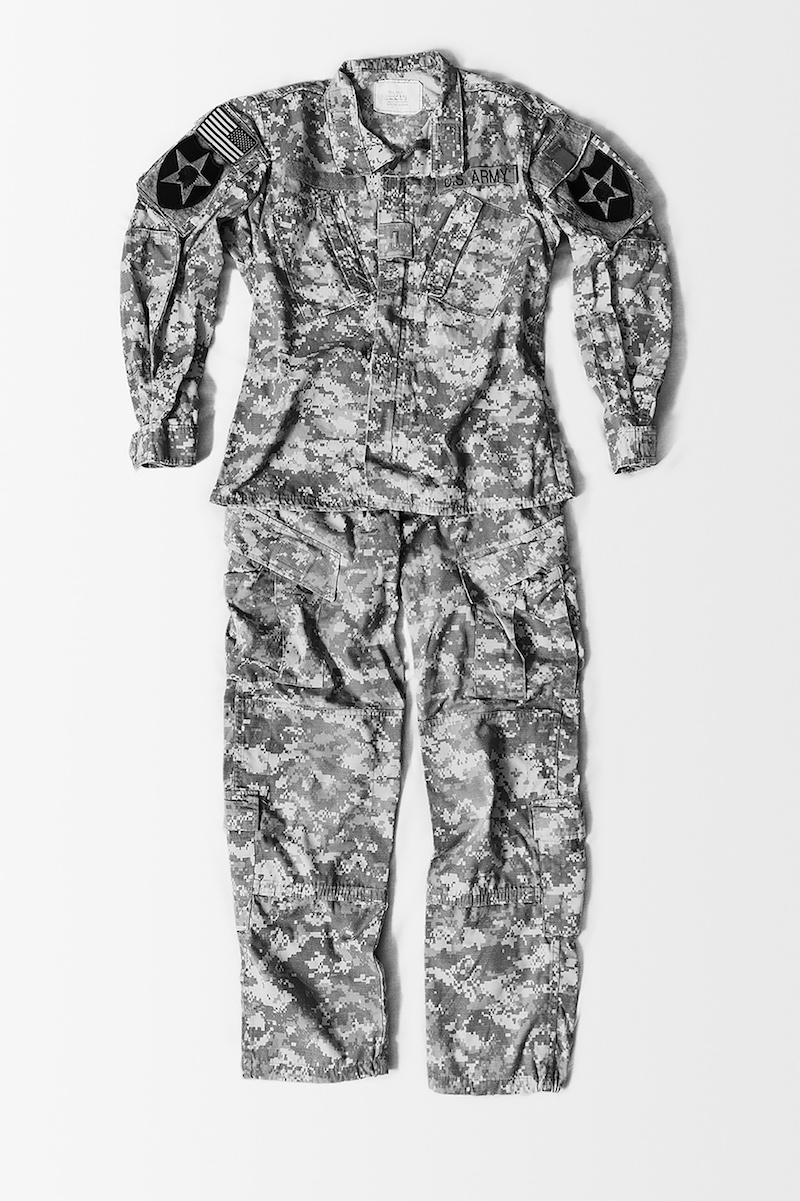
Laia Abril: ‘Military Rape,’ 2019 // Copyright Laia Abril, courtesy Les filles du calvaire, Paris
The first part of the exhibition investigates the origins of rape culture through the reportage of some appalling examples of laws and measures adopted to assess and punish rape cases. From biblical rape laws, which based the punishability of rape on city limits, through the Aristotelian belief in men’s “vital heat,” which transformed blood into semen and legitimized violence as result of “overheating,” to the “two finger test,” an examination performed on rape survivors to verify “vaginal tightness,” which is still in practice in some countries, like India and Pakistan, mandatory in Indonesia for women to join the police and the military, and legal in the United States.
Even more impactful, in light of current events, Abril addresses the use of systemic rape as a weapon of war, and reports a heinous example. During the Bosnian war, Serbian troops set up rape houses and violated between 12,000 to 50,000 Bosniak women and girls as young as 12, the majority of them Muslim, resorting to rape as an instrument of terror and ethnic cleansing.
We are also confronted with the atrocity of corrective rape to “cure” gay women, the controversial use of chemical castration, the castigation of resistance, the manipulation of rape to incite racial discrimination. In 2017, the Italian court of the city of Ancona cleared two men who had drugged and raped a 22-year-old because the victim looked “too masculine and too ugly” to be a target. The survivor, from Peru, had to leave Italy and return to her home country because of the isolation she experienced during the first trial.
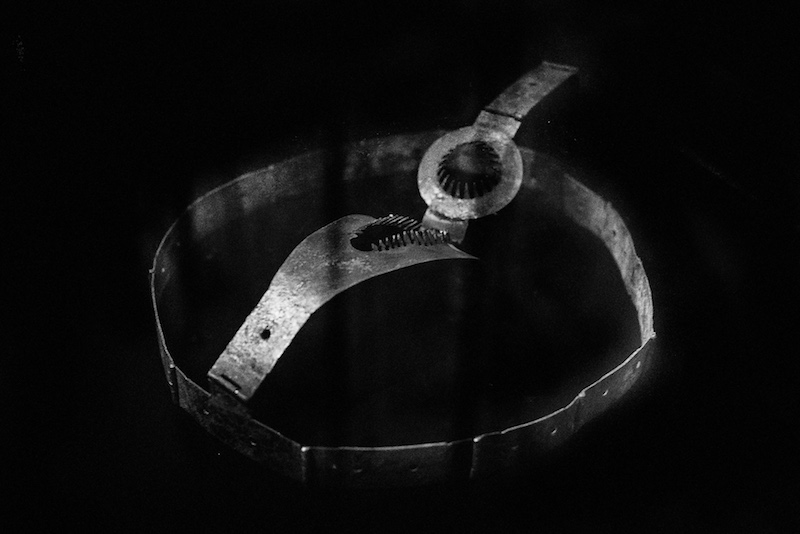
Laia Abril: ‘Chastity Belt,’ 2019 // Copyright Laia Abril, courtesy of Les filles du calvaire, Paris
Through objects from all eras and cultures, Abril lays bare inconsistent assumptions about the female body along with the supremacist hallucinations of a misogynist culture that obliterates women’s pleasure and sexuality, endangers our health, autonomy, life. Traditional expectations of virginity and purity are put to the test in a manner that’s subversive yet weighted, informative, respectful and not overcome by anger or revulsion, eliciting deep empathy from the crowd on the tour, who seems to have fallen into a deferential silence.
Honour is a faulty idea invented by the patriarchy and used to crystallize authority, manipulate victims’ freedom and exonerate perpetrators, and it is questioned extensively in the second part of the show. Here, photographs of life-size uniforms and garments hang on the walls to personify the institutions–educational and religious, the criminal justice system, family, marriage–of which oppression and dependence sit at the very core.
As an example, Passion Star, from the US, was continually subjected to violence and raped by her cellmate during her time in prison. She filed over 30 grievances but was left unsupervised and chastised for being a trans woman in a cisgender, heterosexual and violent setting. Melissa, from Colombia, was five years old when her mum realized she was being abused by her teacher, whose history of sexual misconduct was known to the school, which, however, did nothing but transfer the teacher to another institute.
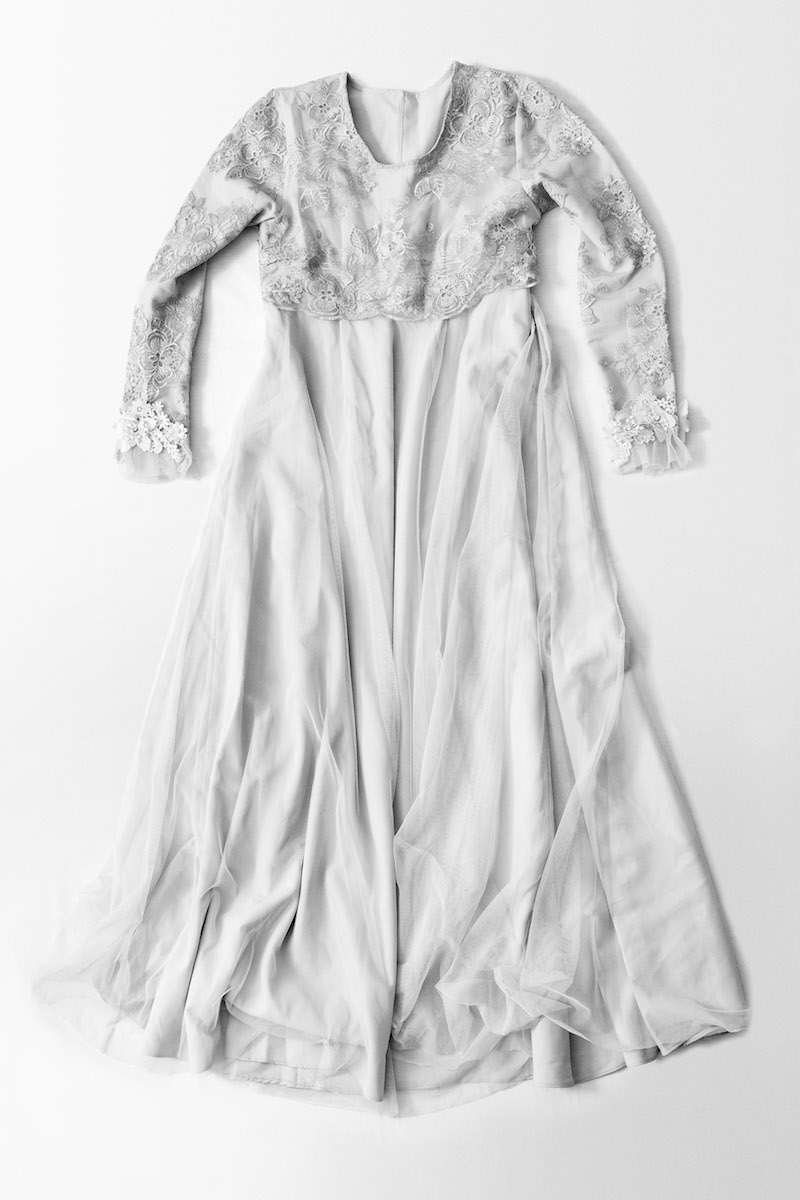
Laia Abril: ‘Ala Kachuu Bride Kidnapping Kyrgyzstan,’ 2020 // Copyright Laia Abri, courtesy of Les filles du calvaire, Paris
Through stories of military rape, of bride kidnapping, of marital rape, pedophilia and femicides, women from different parts of the world–of different ages, backgrounds, beliefs and needs–are put in conversation with one another. Abril’s project is a feminist undertaking, and she wants us to consider her subjects from an intersectional perspective. Gender equality is an available utopia, but it will remain a chimera as long as other structures of injustice stay intact. Until the capitalist and patriarchal system that abets war crimes, racism, colonialism and hinders race, class and gender reforms is refashioned; before an idea of masculinity that’s no longer synonymous with control is put forth.
The third and last exhibition room reveals how rape culture is perpetuated in the everyday, through micro-aggressions, like sexist comments. Horrific statements by politicians and authorities printed in all caps fill the room: ”No one wants to rape anyone who is not a (fresh) virgin” (a judge in Ethiopia); “I’m not going to rape you because you’re very ugly” (Jair Bolsonaro, former president of Brazil); “If it’s inevitable, just relax and enjoy it” (Texan political candidate); “If you wouldn’t have been there that night, none of this would have happened to you.”
By this point Abril was starting to lose hope, but found solace in stories of resilience. She made a collage of stills from female revenge movies, and displayed a lathi (one of the few objects that aren’t photographed). The lathi is a stick used by the Gulabi Gang (“the pink gang”), an Indian all-female vigilante group that fights domestic and sexual violence. The group was founded by its leader Sampat Devi Pal and consists of 400,000 fighters armed with lathis and dressed in pink saris.
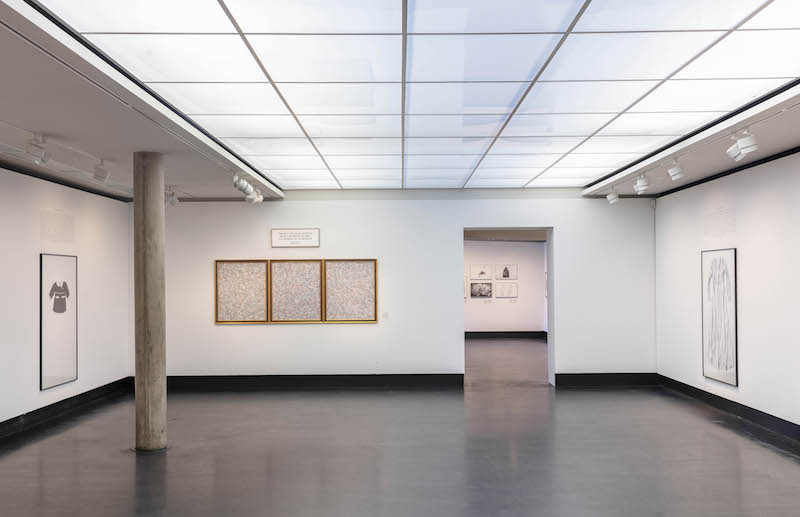
Laia Abril: ‘On Rape – And Institutional Failure,’ 2024, installation view at C/O Berlin // © C/O Berlin Foundation, photo by David von Becker
It is easy to imagine why stories of women avenging themselves hold the kind of appeal that turns them into national legends, larger-than-life heroines, movie icons; sublimated to symbols of female agency and resistance in the face of indifferent authorities. However, Abril doesn’t dwell too long on the lore of female vengeance. She is neither interested in violence, nor in entertaining the tension between the ideal versus the real. “Neither saints, nor whores, only women,” writes journalist Elizabeth Flock in the epigraph of her book ‘The Furies: Women, Vengeance, and Justice,’ a study of myths of female violence across cultures, and their common denominator: male domination.
Like Flock, Abril is concerned with the material conditions that lead to gender-based harm and what solutions are available. As I’m writing this, it’s February 7th and the news that the European Union has agreed to a new directive on violence against women has just been released. Only the EU was unable to agree on a legal definition of rape after months of negotiations, during which members of the Parliament sought to introduce a consent-based definition. Germany was among the countries that opposed it.
As Abril’s first institutional solo exhibition in Germany, the timing of ‘On Rape’ couldn’t be more right. The show is not comprehensive, nor does it aim to be. It is a personal, affective response to a painful research process that skilfully transforms disappointment into vocal resistance. What’s more, she’s successful at sketching how biological difference generates social difference. And calling for us—the random strangers in the room—to take a position in the face of this injustice.
Exhibition Info
CO Berlin
Laia Abril: ‘On Rape – And Institutional Failure’
Exhibition: Jan. 27–May 21, 2024
co-berlin.org
Hardenbergstraße 22–24, 10623 Berlin, click here for map



